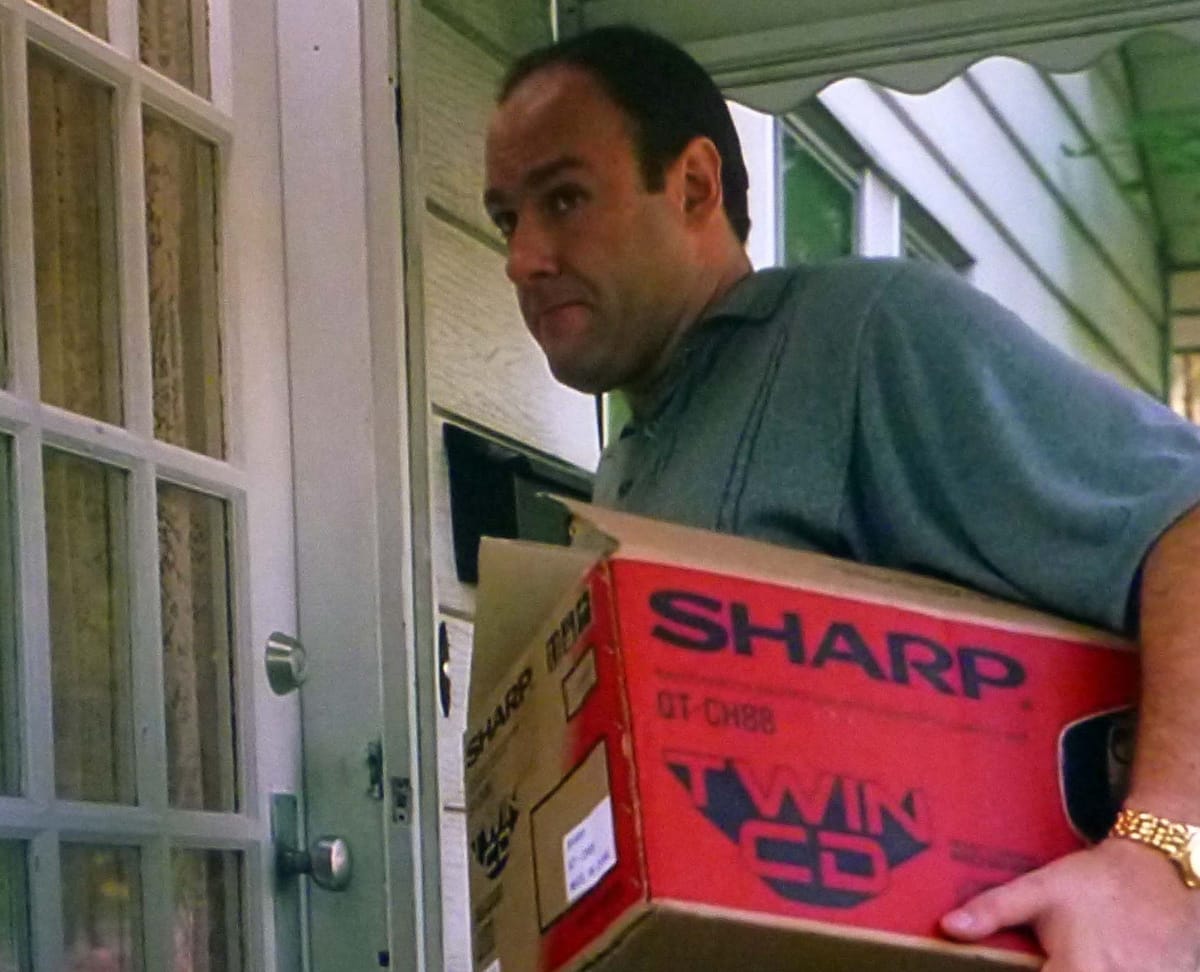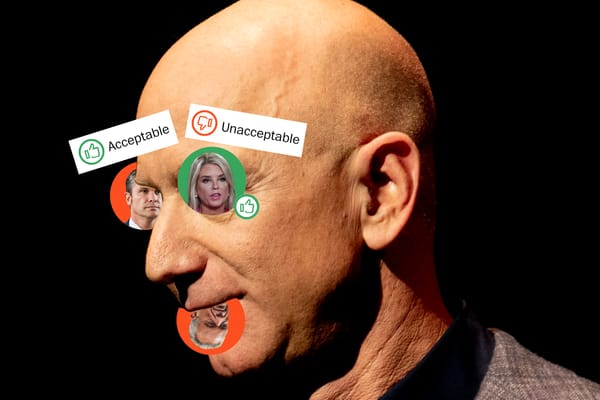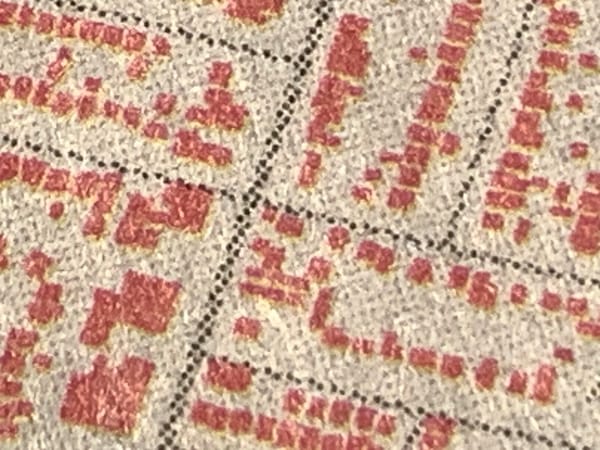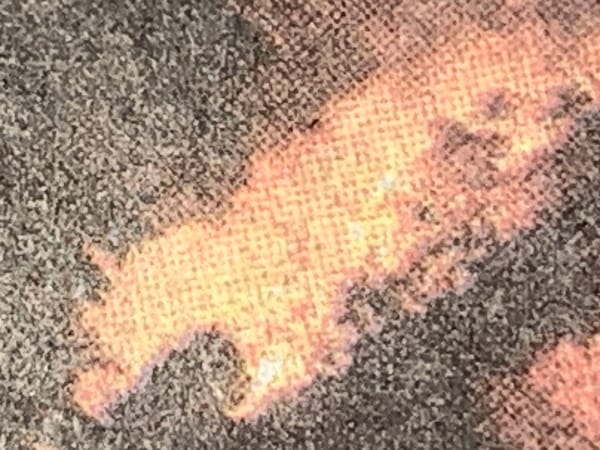Indignity Vol. 2, No. 59: OK, what's this Sopranos show about?
COLD ITALIAN MEATS DEP'T.

Borne Ceaselessly Into New Jersey
OVER THE WEEKEND, I started watching The Sopranos. I'd never seen it, but my wife started going through it on a long plane flight, so I get to join in and catch up. The Sopranos is an old cable television show from the turn of the century, about the domestic and professional troubles of a middle-aged New Jersey mafia boss named Tony Soprano. I assume you know that. I knew that, even though I'd never seen an episode of The Sopranos before now.
That was one of my reservations about The Sopranos, how much I'd already had to hear about it. I don't mean to say that my not watching The Sopranos before now was some matter of principle. Or only vaguely so. It was a premium cable show, and at the time I did not have premium cable; moreover (and this is where my non-participation in the Sopranos phenomenon begins to make its vague approach to principle) I had grown up in a household that did not have premium cable, or any cable really till the cable company finally deigned to send it down our road, and I regarded premium cable as the sort of luxury other people have and mistakenly think is normal to have, like a swimming pool, or a second house in the country.
I guess it’s been available on less-than-premium cable for years now. I got a bundle of premium cable channels from my internet provider as a promotional throw-in, while I was setting up a cheapo TV package that didn't even include CNN, ESPN, or the Turner stations, so I've had access to HBO for a while. Right away, in the first episode, the show establishes that Tony Soprano has a swimming pool. The viewer is meant to recognize the swimming pool as a class signifier, I suppose from above as much as from below: Tony Soprano's swimming pool is at his first (and apparently only) house, whereas someone with as much wealth as, but more cultural capital than, Tony Soprano would have the pool at their second house, the country house.
To be clear, growing up, I didn't know of anyone who had a second house. Nobody needed that degree of distinction. People around Manhattan sometimes talk about their weekend houses like it's an ordinary feature of life, or else they just quietly go there, and the summertime streets get emptier for the people with only one home. Writers publish essays in the nicer magazines, like the New Yorker, or in the New York Times, where they talk about things that happen at their country houses. Or they just Instagram about it.
Anyway it did always rub me the wrong way that the nicer magazines, or the New York Times—or just websites really—would write all the time about The Sopranos like everyone was presumed to be watching it. It was treated as a normal and universal frame of reference, this television show that was in fact a luxury product. It seemed, to me, a particular kind of presumptuousness that writers would act like everybody was expected to know about Tony and Carmela and Dr. Melfi and, what, Big Pussy and Paulie Walnuts, these characters I couldn't avoid learning about through osmosis, the same way you knew about Archie Bunker or Cliff Huxtable or Hawkeye Pierce or Bo and Luke Duke, the characters who came free over the air.
(We didn't watch All in the Family, either, though, and only the last episode of M*A*S*H, when everybody watched it.)
My other reservations about The Sopranos weren't so much mine as my dad's, and I'll get to them in a moment. First, though, before the swimming pool, even, there was the opening title sequence, when Tony Soprano is driving into New Jersey from the Lincoln Tunnel. One thing I can tell you, if you had premium cable back then and just watched it when it was new, is that if you see the opening of The Sopranos for the first time in 2022, it's a shockingly precise period piece. In my mind, on the compressed time horizon of middle age, every TV show I haven't gotten around to seeing happened around five years ago, give or take. But The Sopranos is a historical costume drama, so much so that for a long moment of confusion I really thought they must have filmed it as one. Nineteen ninety-eight, when they filmed the pilot, is a different world. The tollbooth where Tony pulls a ticket to enter the Turnpike—I can recall driving through those Turnpike tollbooths of that era, personally, but onscreen it looks as antique as the tollbooth where Sonny Corleone gets whacked in The Godfather.
Maybe anything that tries to be exactly about a place can’t help being exactly about a time. The view from the ramp corkscrewing out of the Lincoln Tunnel looks nothing like that anymore. Tony Soprano's car window takes in the Empire State Building, still standing in lone dominion leading into Midtown, not forced to share the skyline with Hudson Yards or the ultratalls of Billionaires' Row—and then the show delivers the ultimate, inescapable place-as-time signal: the Twin Towers in Tony’s rear-view mirror.
Here is where my own sense of time goes truly haywire. Before 2004, when I was hired by the New York Observer, I almost never went to New York, or had any real interest in going to New York. By now, though, I've lived in New York much longer than I've lived any other place in my adult life, so that the discontinuity of my pre–New York years blurs into the overall continuity of my grown-up existence from the 1990s to today. The result is that I fundamentally can't understand that the Twin Towers would have still been standing in the '90s, when I was living through the ‘90s. Every time I see them in a movie or music video it registers as a chronological glitch: I remember when The Sopranos was new, and I never shared the city with the Twin Towers, so I irrationally assume they must have CGI'd the towers into the credits.
Whoever you were before is still going to be who you are, despite what I gather that Don Draper guy did with his identity in that other premium-cable TV show everybody always wrote about. That brings me back to the other thing about The Sopranos. My dad, an educated scientist born into the Italian-American working class, hated the whole idea of it. More cartoon greaseball shit, Italians doing mobster entertainment because they couldn't think of what else to do. He was disgusted, at the time, by hearing about swarms of Italian-Americans showing up for a casting call, trying to get on TV by acting like the thing everyone looked down on them for.
My dad's people—my people—are South Philly Italians, which is close enough to Jersey Italians. Our one and only family reunion, in fact, was over the river in Cherry Hill, New Jersey, in a dimly lit place called Cinelli's. There were trophy animal heads on the walls, with little plaques saying which member of the Cinelli family had shot them, and as I recall it, we got little pen holders with marble bases to take home. The pen was a ballpoint, and the back doubled as a letter opener.
Over the years, and especially toward the end of his life, my dad accumulated a little library of books about Italian-American identity and sociology—Philadelphia ethnic history, a treatise on the Evil Eye. He was just old enough to remember going along with his grandfather, during the war, to watch him do whatever sort of check-in an alien immigrant was supposed to do, to stay in America's good graces. He grew up aware that the country was ready to think the worst, and with the slums close and real enough to take the appeal out of slumming. .
So now here, for the new millennium, we got these dago thugs, beloved by Americans with summer homes, in this show created by a “David Chase.” David DeCesare, Wikipedia says. The grandfather changed it for “business reasons,” as my dad would say—a standing punchline, with the smell of garlic rising from the sound of the quotation marks.
When my dad would say something about garlic, it was different from when other kinds of people would say something about garlic. S.I. Newhouse, the man who owned the very nicest magazines, was famous for refusing to even allow garlic in the cafeteria of the Conde Nast building. This was a fact even when I was living in New York.
Look, I won’t deny we’re a risible people. The Irish—even the Irish!—got a gangster’s kid elected president, while we got Michael Corleone. So far we top out with the Speaker of the House, Tommy D’Alesandro’s daughter. The other Tommy D'Alesandro's sister. Plus we put a couple sweaty primitives on the Supreme Court, proud to put the pope (the right-wing Polish pope, anyway) ahead of the country. And Joseph Mancini III, the coal baron playing hillbilly, going around as “Joe Manchin.” More “business reasons.”
Or Rudy Giuliani, God help us, leading the cops in a race riot, shoplifting Yankees gear, getting falling-down drunk on wine, stumbling around with his fly down or his hair dye sweating down his face. He thought he could be president, this crooked buffoon, this horny hot-tempered creep who dreamed he was the lead tenor in his own opera.
What do you do with an ethnicity like that? Usually I don't dwell on it. We stand and fall as individuals, right? Most people, unless they correctly place the name, don't make me as Italian at all, with my father's blue eyes and light hair. Yet I got a little misty in 2020 hearing the voice of Philly and New Jersey's Jill Biden—born Jacobs, grandfather born Giacoppo—talking on national TV. She sounded like one of my aunts.
With this old TV show, it feels close enough to home that, even while I'm enjoying it, I wonder who this DeCesare person was talking to. When characters say "Soprano," they say it with a short A, up in the nose. Like I would have said it before I learned to say "so-prah-no." Who gets to laugh at the details? The show is extremely funny, even if it's been so talked to death in advance that I can't always tell which parts are a little on-the-nose and which ones I just already knew about. It's always been a fine line, or no line at all, between representation and minstrelsy.
Never in my life have I said "gabagool" in earnest, or known anyone who did. We'd say capicol'. But I still stumble trying to bridge the gap between the written word "prosciutto" and the brazhoot I grew up eating off cold-cut plates on holidays. And I went looking, a few years ago, for a recipe that would help me make my dad's jambot', the vegetable stew that’s like a less fussy ratatouille. The recipes online that came closest, it turns out, were based on "Carmela's giambotta," from The Sopranos Family Cookbook.

INDIGNITY is a general-interest publication for a discerning and self-selected audience. It could be you, or a special someone!





![Screencap from the video, caption "[Toshiaki] Nice and chewy." Buldak Chicken Carbonara $1.38/pack](/content/images/size/w600/2025/01/ramen-chewy-2025-01-10-at-7.38.57-PM.jpg)